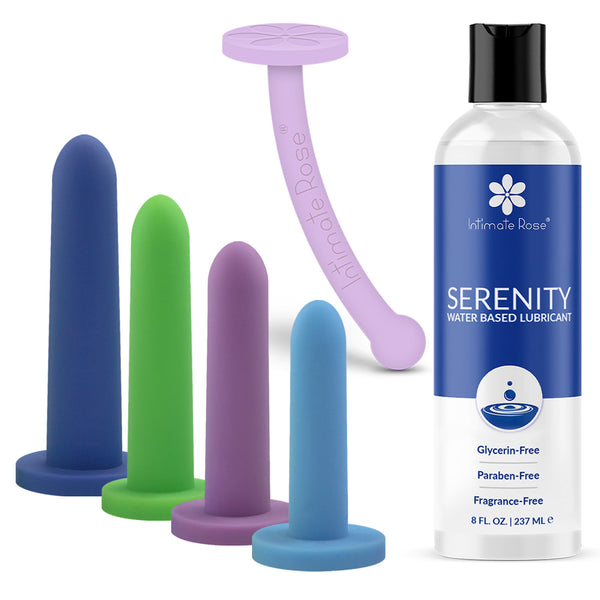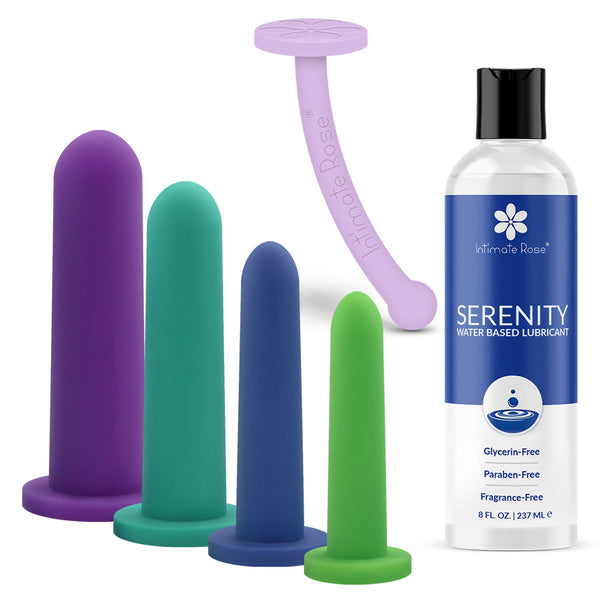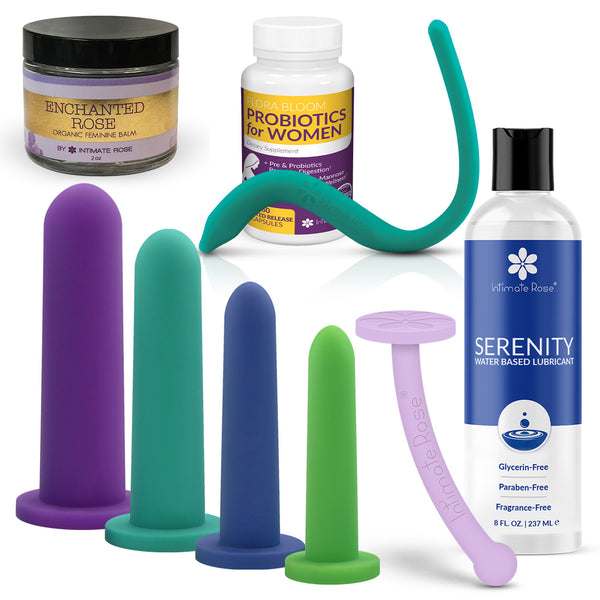Do you suffer from an abnormally tight vagina that causes pain during sex, penetration, or even when using a tampon?
If you answered “yes”, know that you’re not alone. Women worldwide suffer from tightness of the vaginal opening or canal, feel that their vagina is too tight, and experience this pain.
The good news is that aside from the rare physical abnormality or underlying health condition, most vaginas can be trained to relax, loosen and accept objects such as a male penis or tampon using a combination of dilator or pelvic wand therapy and exercises to stretch the vagina.
What you'll learn
In this article, Dr. Amanda Olson answers a few of your most common questions about the underlying causes of a tight vagina and techniques to help improve its elasticity, loosen the opening and canal, and reduce pain and discomfort during sexual activity or penetration.
We always recommend working with a pelvic floor physical therapist to ensure you have the right resources for your condition. However, intimate Rose will help connect you to one in your area if you contact us directly.
What are some common underlying causes for a vagina being too tight?
There are a number of reasons why your vagina may feel tighter than usual and cause you to experience pain. Below we've listed common contributors, although this list is not exhaustive.
1.) Infections
Common infections that can cause tightness of the vagina include STDs (sexually transmitted diseases) and vaginal yeast infections.
2.) Injuries or Physical Trauma
Injury to the area or surrounding tissues from accidents, physical trauma, childbirth or rough sex can be contributing factors. In addition, those injuries causing scar tissue may pose additional challenges.
3.) Dyspareunia
Dyspareunia is the medical term for pain during penetrative sex stemming from psychological or physical issues. Dyspareunia can precede sex or occur during sex itself. Over time, painful intercourse can lead to a guarding response, making the vagina feel too tight or prohibiting penetration.
4.) Changes to the Vaginal Tissues Post-Childbirth
Having children vaginally can result in changes to the elasticity and sensitivity of the vaginal canal as well as physical changes to the muscles involved in giving birth.
For other new mothers, fluctuations in estrogen levels when breastfeeding can cause vaginal dryness, resulting in discomfort and sometimes loss of elasticity. In other cases, scar tissue after birth could cause restriction of the pelvic floor itself.
5.) Vaginismus
Vaginismus is marked by involuntary muscle spasms occurring just prior to penetration. These spasms can be both painful and embarrassing, arising before sex, insertion of a tampon, or during medical examinations.
6.) Sexual Abuse Or Assault
Sexual abuse of any type or degree is a traumatizing event that often has a lasting impact on the mental health of the victim. This can make sex–even every day, consensual sexual encounters–stressful and overwhelming. In addition, as a physical reaction, the body’s own “flight or fight” mechanism may cause involuntary tightening of the pelvic floor muscles, leading to painful intercourse or an inability to achieve penetration.
7.) Menopause And Hormonal Changes
Hormonal changes due to medical conditions, medications, or menopause later in life can result in a range of symptoms including but not limited to vaginal atrophy, reduced elasticity of the vagina, dryness (less natural lubrication), mood changes, weight gain, and more.
8.) Medical Conditions, Treatment or Medications
Several medical conditions, treatments, and conditions can result in a tightening of or an inability to easily ‘loosen up’. Cancer treatments such as radiation, conditions that inflame or irritate surrounding tissues, and medications that affect hormones can all cause issues

45-Min Online Pelvic Therapy Session, $99
What can I do to reduce my vaginal tightness?
Although every woman’s body and vagina is unique, several reliable methods can be incorporated into your regimen to help reduce the symptoms and underlying causes of feeling too tight, which are common symptoms of vaginismus.
Use a Dilator To Help Stretch The Vagina
One of the most effective, reliable, affordable, and simplest ways to do this is using specially designed tools called vaginal dilators.
What is a Vaginal Dilator?
A vaginal dilator is a medical device shaped to resemble a tampon or dildo gently tapered towards the insertion point to make initial penetration easier. They are made from medical-grade materials engineered to be comfortable and gentle on the surrounding tissue and are available in a broad range of sizes and lengths.
Many underlying medical conditions negatively affecting the elasticity of the canal can be addressed with a vaginal dilator. Those conditions may include painful sex (also known as Dyspareunia), and other symptoms related to Vaginismus. Find more resources and support in our Dilator HUB.
Real People, Real Stories:
"Twelve years ago, I was diagnosed with stage 2 hormone-positive breast cancer. After a double mastectomy, my oncology team recommended a total hysterectomy. Menopause hit hard, bringing unbearable pelvic pain, itching, and bleeding. Thankfully, my oncology nurse advocate referred me to a pelvic floor therapist who diagnosed me with pelvic floor dysfunction and vaginal atrophy. I started vaginal dilation, which was awkward at first, but it became key to my recovery. With consistent therapy, I was able to resume comfortable intercourse with my husband and avoid further complications like vaginal stenosis and incontinence. Now, I use a combination of dilators and moisturizers to maintain my pelvic health. Dilation was life-changing for me, and I hope my experience encourages other women to take their therapy seriously. It may feel uncomfortable or strange, but it's essential for healing and long-term well-being." — Madilyn G
How does a vaginal dilator work?

Use a Pelvic Wand To Help Stretch The Vagina
A pelvic wand is beneficial for addressing muscle tightness and tender points in the pelvic floor muscles. In addition, the pelvic wand can be used for gentle mobilization, myofascial release, and softening scar tissue around and inside the vagina.
How Does a Pelvic Wand Work?
For pelvic tender point pain, Intimate Rose pelvic wands are perfect for those hard to reach pelvic floor muscles, such as obturator internus and puborectalis. The dual-end can be used rectally or vaginally. We even offer various types of wands–some that offer vibration and even on that can hold a hot or cold temperate!
Pelvic wands are often used superficially for perineal massage, introitus stretching, and to reach deeper pelvic floor muscles. They are a great option for anyone suffering from Endo/IC pain, tailbone pain, hypertonic muscles, or deep dyspareunia.
So, what is better for pelvic tightness; a vaginal dilator or pelvic wand?
Depending on your specific diagnosis and goals, a pelvic wand or vaginal dilator may be recommended. And in some cases, you might benefit from both vaginal and pelvic wands to treat pelvic pain.
In the simplest of terms, vaginal dilators are used to treat restriction at the vaginal opening and difficulty with any form of penetration such as from pelvic exams, tampons, or sex. They are Ideal for those with vaginismus, scar tissue, or hypertonic muscles.Pelvic wands are used superficially for perineal massage, introitus stretching, and to reach deeper pelvic floor muscles. They are great for those suffering from Endo/IC pain, tailbone pain, hypertonic muscles, or deep dyspareunia.
As mentioned above, pelvic wands and vaginal dilators often work fantastic together –in fact, we call them our pelvic pain gamechangers!
What Exercises Can I Do to Help Stretch and Loosen My Vagina?
Certain types of stretching and exercises can increase voluntary control over the musculature and tissues of the vagina. Intimate Rose has many resources around pelvic floor stretches and exercises to help relax the pelvic floor, so be sure to look in our video and blog libraries for pelvic floor exercises.
Often when we talk about pelvic floor exercises, kegels exercises come to mind. Kegels are a contraction of the pelvic floor muscles and, in some cases, can make issues of vaginal and pelvic floor tightness worse and can increase pain. Therefore, Kegels should be avoided until pain and restriction in the pelvic floor have been addressed.

45-Min Online Pelvic Therapy Session, $99











